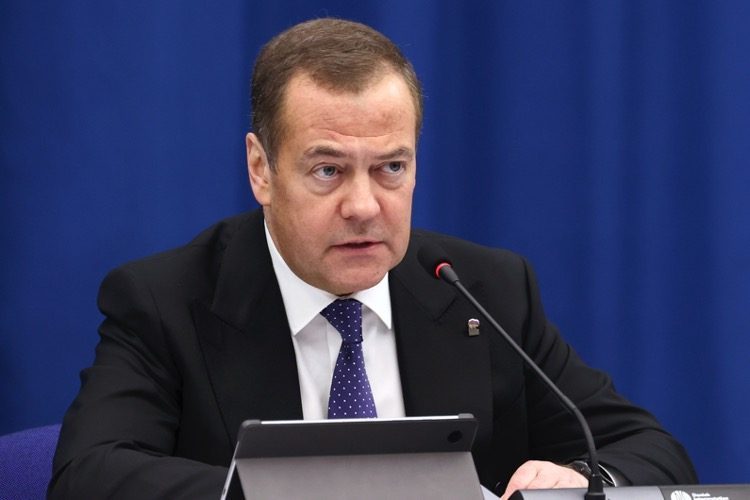
A full-scale war between Russia and NATO would leave Moscow with no choice but to mobilize its nuclear assets, former president Dmitry Medvedev said, adding, however, that his country is not pursuing a conflict with the U.S.-led military bloc.
Writing on Telegram on Wednesday, Medvedev, who now acts as deputy chairman of Russia’s Security Council, pushed back against statements by numerous Western leaders urging their countries to prepare for a potential conflict with Moscow.
Russia has repeatedly said it has no plans of staging a conflict with NATO and the EU, he noted, despite the latter continuing “a dangerous drivel” on the topic. He hinted that this narrative is designed to distract Western voters away from huge spending on aid for Ukraine — an effort he said many have already grown tired of.
Medvedev argued that this fatigue came from Western leaders’ desire to help “a dying country that is foreign to taxpayers,” while ignoring social problems at home. “Therefore, every day the leaders of these countries broadcast: We need to prepare for war with Russia and continue to help Ukraine,” he said.
Nonetheless, Medvedev warned that a possible Moscow-NATO war would be significantly different from the Ukraine conflict and would not use artillery, tanks, and drones. He noted that the alliance has a combined population of nearly one billion people and defense spending reaching $1.5 trillion, making it far superior to Russia.
“Since our military capabilities are incomparable, we will simply have no choice. The response will be asymmetrical. To protect the territorial integrity of our country, ballistic and cruise missiles with special warheads will be used…. This will be the proverbial Apocalypse. The end of everything.”
Amid this situation, he asked Western politicians to tell their voters the “bitter truth” about what would happen in the event of war with Russia instead of “treating them like brainless idiots.”
Russian officials have repeatedly said they have never threatened to use nuclear weapons, but have noted that such weapons could be mobilized if the very existence of the state was at stake. In December, Russian President Vladimir Putin also said Moscow “has no interest … geopolitically, economically or militarily … in waging war against NATO.” Russia, however, has argued that the bloc’s expansion toward its borders poses an existential threat.
NATO’s Steadfast Defender 2024 war games that kicked off in Europe in January undermine Russia’s national security, Kremlin spokesperson Dmitry Peskov stated recently, pointing out that the U.S.-led bloc is an “instrument of confrontation.”
The exercises, hailed to be the largest NATO has held in decades, are said to entail some 90,000 troops from all 31 member states as well as Sweden and will last for several months, eventually concluding in May, as per the alliance’s Supreme Allied Commander for Europe Christopher Cavoli.
Besides, some 1,100 combat vehicles, including 133 tanks and 533 infantry fighting vehicles, as well as more than 50 naval vessels and 80 helicopters, drones, and fighter jets are set to take part in the exercises.
Regarding the war games, Peskov noted that NATO has always been meant to be an “instrument of confrontation” that is controlled by Washington.
“The alliance, in fact, was conceived, formed, configured and is currently managed by the United States precisely as an instrument of confrontation. This instrument continues to fulfill its role and, of course, it is a threat to us,” the Kremlin spokesperson said, elaborating that Moscow would continue to take corresponding measures in retaliation, particularly as NATO keeps expanding its military infrastructure toward Russia’s borders.
The start of NATO’s military drills come as a number of officials from its member countries, including the U.K., Germany, and Estonia, have been calling on the bloc to prepare for a full-scale military confrontation with Russia in the near future, suggesting that Moscow had plans to attack Europe in the next few decades.
Russia has vociferously dismissed any such plans, calling the claims a “hoax,” saying that he would instead prefer to cultivate a relationship with the U.S.-led alliance.
In an opinion piece for The Wall Street Journal published Wednesday, German Chancellor Olaf Scholz underscored that Western countries must continue to back Kyiv, arguing that not doing so would not only have disastrous consequences for Ukraine, but would also “dramatically change the face of Europe.”
“Despite our support, Ukraine could soon face serious shortages in arms and ammunition,” he said, noting that some Western financial commitments have already ended and many others need to be extended.
Scholz posited that the West has “to do [its] utmost to prevent Russia from winning…. If we don’t, we might soon wake up in a world even more unstable, threatening and unpredictable than it was during the Cold War.”
To reach this goal, Western countries should sustain their military support for Kyiv, while persuading voters that helping Ukraine is a just cause, Scholz suggested. They should also ensure that the collective defense of NATO is credible, he continued.
The chancellor repeated, however, that “we don’t see ourselves at war with Russia and don’t seek confrontation with Russia.”
Officials in Kyiv have admitted serious issues with ammunition, while top EU diplomat Joseph Borrell has acknowledged that by March, the EU will supply Ukraine with only half of the one million shells promised in early 2023.
Scholz’s comments also came after Ukraine’s much-hyped counteroffensive last year that failed to obtain any ground despite widespread Western military support. As per Russian Defense Minister Sergey Shoigu, Ukraine lost 215,000 troops and 28,000 pieces of military equipment in 2023 alone.
Russia has denounced the arms shipments to Ukraine, warning that they will only drag the conflict on while making the West a direct participant in the war.


